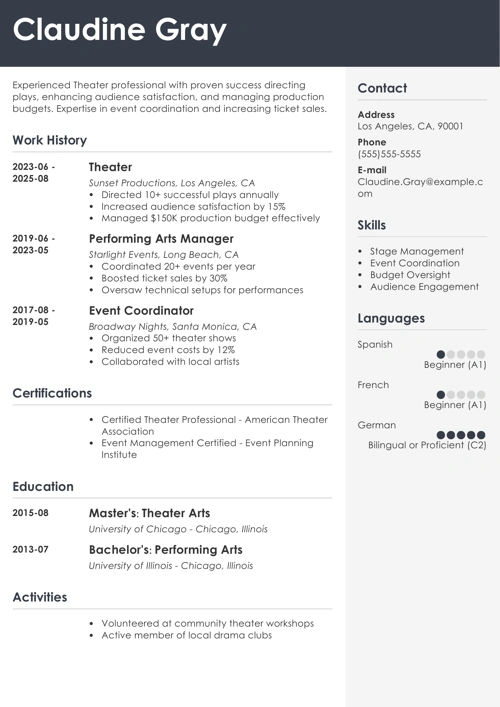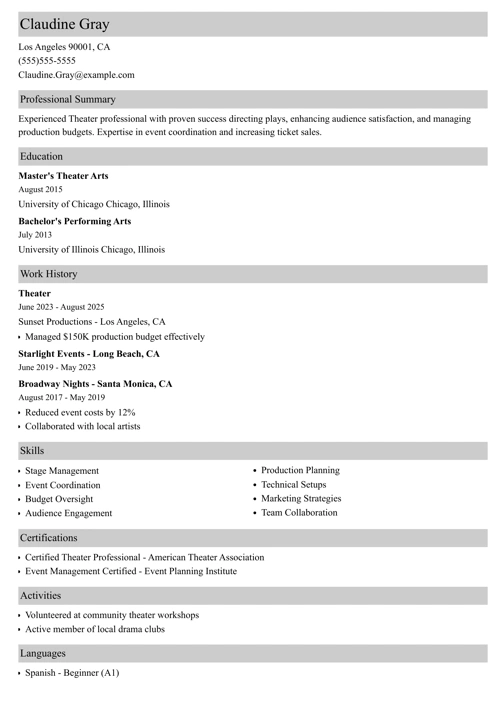To be or not to be?
If that’s the question you ask yourself to get cast in the newest play or land a theater job of your dreams, please stop. The only question is how?
Luckily for you, we’ve got the answer. To steal the spotlight, you need a perfect theater resume template. And learning how to make one will take less time than memorizing two lines for an audition. So please, enjoy the show, as we present our latest production called Theater Resume.
This guide will show you:
- A theater resume example better than 9 out of 10 other resumes.
- How to make a theater resume that will land you more interviews.
- Tips and examples of how to put skills and achievements on a theatrical resume.
- How to describe your experience on a theater acting resume to get any job you want.
Want to save time and have your resume ready in 5 minutes? Try our AI resume builder. It’s fast and easy to use. Plus, you’ll get ready-made content to add with one click. See 20+ resume templates and create your resume here.
Sample resume made with our builder—See more resume examples here.
If you want to see more sample resumes for creative jobs, check out our dedicated guides:
- Acting Resume Sample
- Beginner Acting Resume Sample
- Artist Resume Sample
- Film Resume Sample
- Filmmaker Resume Sample
- Stage Manager Resume Sample
- Makeup Artist Resume Sample
- Dance Resume Sample
- Performing Arts Resume Sample
- Best Resume Examples
Theater Resume Template
Claudine Gray
Theatrical performer
claudine.gray@email.us
443-314-4703
Height: 5’7
Eyes: blue
Tone of voice: Mezzo-soprano
Membership: TANYS
Professional Summary
Passionate musical actor featured in numerous Broadway productions. Award-winning theatre performances in John Smith’s Ophelia and Stephen Oremus’ Wicked. Accustomed to the demanding stage sets and backed by a network of stage contacts. Known for artistic integrity and classic mezzo-soprano.
Theater
- Wicked, Glinda, Gershwin Theatre (Stephen Oremus)
- Beautiful, The Carole King Musical, Cynthia Weil, Stephen Sondheim Theatre (Douglas McGrath)
- Hamlet ,Ophelia, The Shakespeare Theatre (John Smith)
- Othello, Desdemona, Bryant Park Theater (Mary Doe)
- The Blackberry, Louis, Jacobs Theatre (Mark James)
- Passage, Young citizen, Soho Repertory Theatre (Christopher Chen)
- Romeo and Juliet, Juliet, Carroll Park (John Smith)
Film and Television
- The True Colors, Amanda, Mark and Co. Productions
- Man with a Plan, Kate Burns, CBS (Jackie Filgo and Jeff Filgo)
Education and Training
The New York Film Academy's Musical Theatre School
Graduation year: 2016
- Pursued my passion for acting and musical singing.
- Starred in five school productions.
- Awarded Best Performer of 2019.
Voice training: Oprah Mia, Louis Drake
Special Skills
- Dance (improvisational, modern)
- Singing (musical, pop)
- Accents
- Strong presentation skills
- Collaboration and teamwork
- Critical thinking
- Decision making
- Stamina
- Time management
Languages
- French
- Spanish
- Arabic
Here’s how to write a theater resume that steals the show:
1. Choose the Best Format for Your Theater Resume
Whether it’s a first round audition or callbacks—you need to draw the director’s attention right away.
How to do this?
Create a theater resume perfect for a quick review.
For this to happen, follow the best resume formatting rules:
- Begin with a professional resume header that holds your contact info and physical attributes, such as height and eye color. Under the resume header list your professional affiliations.
- Working on a musical theater resume? List your tone of voice in the header, too.
- Divide your document into easily navigable resume sections.
- Choose the best format for your resume. In most cases it’s the chronological resume layout. It will help you organize all your acting credits.
- Use a classic resume font. Showy fonts won’t get you far.
- Don’t cram your resume with text. Leave enough white spacing.
- Confused about whether to go with a PDF or Word resume? Stick to the PDF. It’s printer-friendly and it opens everywhere.
Pro Tip: Theater resumes are usually two-sided: one side being your headshot, and the other side the actual text of your resume. Make sure the two fit nicely together and set the dimensions of the photograph to 8x10. This is particularly important when you're handing in a paper copy of your application.
2. Write a Theater Resume Objective or Summary
What’s the next step that leads onto the stage? Writing a great professional profile for a theatrical resume to make the casting committee want to read on.
This is a short introductory paragraph placed at the top of your theater resume and it comes in two forms: a resume summary or resume objective.
Here’s the difference between them:
A career summary works best for artists with 2+ years of on-stage experience. It focuses on your best roles and key achievements.
A career objective is a better choice for beginners. It highlights skills you’ve learned and reflects your passion for the profession.
Pro Tip: If you’ve learned the tricks of the acting trade under a teacher known in the industry, mention the teacher’s name in your theater resume profile.
3. Create an Applaudable Theater Resume Experience Section
The experience section on theatrical resumes differs from the traditional resume job description section. But it’s still the most important part of your application.
Tailor your resume experience section to the job offer you’re targeting and make it accurate.
Here’s how:
- Group your acting credits by category: theater, film, or television.
- Put the theater category up front as it’s the most relevant.
- List the play or movie title, the role you played, name and location of the venue or production studio, plus a director’s name.
- Within each category, begin with your most prominent role.
- List your credits in the form of bullet points.
- Cut to the chase—wordy descriptions won’t boost your chances of getting noticed.
Pro Tip: If you a fresher actor worried that you don’t have actual credits for your theatre resume, don’t worry. List scene work from the acting classes you took.
4. Make Your Theater Resume Education Section Stand Out
You’re an artist. Why would you bother to list schools on a theater acting resume, right?
Wrong.
Your formal education and training are substantial for your future theater career. Any acting, dance, and voice workshops may back up your way to Broadway.
Here’s how to make your resume education section shine:
- If you have more than 5 years of professional experience, stick to listing your degree, school name and location, and graduation year. That’s it.
- If you’re less experienced and you don’t have many stage credits, elaborate on your acting training. List your GPA, acting-related workshops, studio classes, private coaching, etc.
Pro Tip: Want to pursue an on-stage career but you have no formal education in place? See these top 25 BFA acting programs you can register to now.
5. Highlight Your Skills on a Theatre Resume
To get the chance to present your skills in practice, you first need to name the right ones on your theater actor resume.
Use the list below as a hint. But remember—On your theatrical resume, you have to include theatre skills that are most relevant to the audition you’re going to attend.
Theater Resume—Special Skills
- Dance (improvisational, jazz, ballroom, ballet, hip-hop, etc.)
- Singing (musical, opera, pop, etc.)
- Accents
- Mime
- Hosting
- Strong presentation skills
- Effective communication
- Fluency in another language
- Collaboration skills
- Critical thinking
- Decision making
- Problem solving
- Time management
We’ve analyzed over 11 million resumes created using our builder, and we’ve discovered that Theater Performers commonly list skills such as script memorization, following directions, audience entertainment, problem-solving, and written communication.
Pro Tip: Can’t pretend voices and do the headstands? Don’t make up skills on your theater resume. The casting committee will want to verify them.
Making a resume with our builder is incredibly simple. Follow our step-by-step guide, use ready-made content tailored to your job and have a resume ready in minutes.
When you’re done, our AI resume builder will score your resume and our resume checker will show you exactly how to improve it.
6. Add Other Sections to Your Theater Resume
Want the artistic director to learn more about you?
Consider adding the following optional sections to your theater resume:
- Achievements and awards
- Grants
- Memberships
- Publications
- References
- Media mentions
- Volunteer experience
- Hobbies and interests
Pro Tip: Awards added to your theater acting resume should be professional. Acting class awards from college? These may offend the judges. If your award is prominent for a specific role, place it just below the related credit in the experience section of your resume.
7. Attach a Cover Letter to Your Theater Resume
But theaters don’t require cover letters.
That’s only a half-truth.
Actually, almost 50% of employers consider a cover letter the second best thing to give your resume a boost. (You can read more here.)
Writing a job-winning cover letter to add to your theatrical resume isn’t that difficult. Just follow these tips:
- Choose the right format for your cover letter.
- Start cover letter first paragraph with an interesting professional detail about you so far theatrical experience, like your biggest role or what you love about acting.
- Elaborate on your passion in the middle paragraph.
- Close your cover letter with an offer or call to action.
- Your cover letter length should not exceed 350 words.
Pro Tip: When writing your cover letter for theater jobs do not repeat your resume. Cover letters are meant to complement resumes. Not repeat them.
Plus, a great cover letter that matches your resume will give you an advantage over other candidates. You can write it in our cover letter builder here. Here's what it may look like:
See more cover letter templates and start writing.
This is it!
That’s how you write an applaudable theater resume!
About Zety’s Editorial Process
This article has been reviewed by our editorial team to make sure it follows Zety's editorial guidelines. We’re committed to sharing our expertise and giving you trustworthy career advice tailored to your needs. High-quality content is what brings over 40 million readers to our site every year. But we don't stop there. Our team conducts original research to understand the job market better, and we pride ourselves on being quoted by top universities and prime media outlets from around the world.





